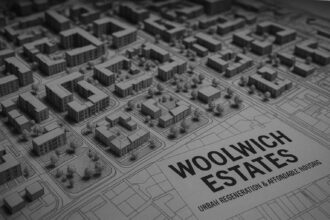After six months on the market, a couple selling their family home wrestles with the emotional challenge of viewings, as experts advise avoiding personal involvement during showings to increase buyer interest and secure the best price.
After six months of attempting to sell their family home, a couple finds themselves at a crossroads informed by emotional ties and practical considerations. As they look to downsize due to physical limitations, the significance of their present dwelling—a place filled with years of family memories—intensifies their attachment. However, they face a dilemma: should they allow their personal connections to impact the selling process, especially during viewings?
The husband’s concern centres on his wife’s strong involvement during prospective buyer viewings. She passionately shares the home’s history, recounting cherished family moments and discussing necessary renovations. While this enthusiasm is commendable, property experts suggest that such personal engagement may inadvertently deter potential buyers.
Jane Denton, writing for This is Money, underscores the need to navigate the delicate balance between sentimentality and market dynamics. Sellers, she asserts, must refocus on the objective: achieving the best price possible in the shortest time frame. This is particularly crucial in a competitive real estate landscape where first impressions significantly affect buyer perceptions. Research shows that emotional connections formed through personal narratives can often overshadow buyers’ ability to envision their own lives within the space.
To bolster this point, Liam Gretton of Liam Gretton Bespoke Estate Agent emphasises that effective viewings hinge not on the owner’s presence but on the strategic management by an estate agent. The viewing process is steeped in emotional connection; potential buyers who have developed a mental image of living in the home can feel that vision clouded by a seller’s recollections. The distinction between first viewings, which are driven by emotion, and subsequent viewings that shift towards logic, illustrates a critical phase where outside perspectives can add significant value.
As buyers contemplate potential alterations or lifestyle adjustments in the home, they may hesitate to express concerns or offer suggestions if the owners are present. This reluctance can stifle open dialogue and the kind of honest feedback that is invaluable during the sales process. Without the risk of offending current inhabitants, prospective buyers might feel freer to engage honestly—essential for nurturing genuine interest.
Reinforcing this perspective, Amy Reynolds from Antony Roberts echoes the sentiment that owners should vacate the premises during showings. She advises homeowners to allow buyers the mental and physical space required to consider their future rather than feeling tethered to the property’s past. Instead of overwhelming buyers with nostalgia, which may be heartwarming but obstructive, Reynolds suggests crafting a brief letter detailing the home’s story for the estate agent to distribute post-viewing. This strategy allows the history to resonate while maintaining a focus on the practical aspects of buying.
Beyond interpersonal dynamics, common practices in home staging and presentation also play a pivotal role in the selling process. The importance of decluttering, freshening up paintwork, and maintaining cleanliness cannot be overstated. Presenting a home that is well-maintained and inviting not only enhances visual appeal but also contributes to the overall buyer experience. According to numerous guides, including insights from industry professionals, achieving a neutral décor and creating an inviting atmosphere are essential.
Investments in presentation, such as professional photography and minor repairs, further elevate the property’s marketability. Ensuring curb appeal, from an inviting entrance to well-maintained garden spaces, can make a tangible difference in a buyer’s initial impression. Reports indicate that properties projected in their best light often receive higher offers and discernibly faster sales.
As the couple deliberates their path forward, it is clear that removing personal sentiment from the sale could pave the way for a successful transition to their next chapter. By relying on real estate professionals and focusing on strategic advice, they can optimise their home’s selling potential, ultimately securing a favourable outcome in a landscape fraught with emotional complexity.
Reference Map:
- Paragraph 1 – [1]
- Paragraph 2 – [1], [2]
- Paragraph 3 – [1], [3]
- Paragraph 4 – [1], [6]
- Paragraph 5 – [2], [4]
- Paragraph 6 – [5], [7]
Source: Noah Wire Services
- https://www.dailymail.co.uk/money/mortgageshome/article-14742267/My-wife-insists-showing-potential-buyers-house-just-let-estate-agent-it.html?ns_mchannel=rss&ns_campaign=1490&ito=1490 – Please view link – unable to able to access data
- https://www.dbroberts.co.uk/news/the-psychology-of-selling-your-home-how-buyer-perception-shapes-the-sale/ – This article discusses how buyer perceptions, influenced by emotions and first impressions, can impact the sale of a property. It emphasizes the importance of curb appeal, neutralizing personal ties, and creating a welcoming atmosphere to make a positive impression on potential buyers. The piece also highlights the role of scent and color psychology in shaping buyer emotions and perceptions, suggesting that subtle scents and neutral tones can enhance the property’s appeal. Additionally, it offers staging tips to maximize space and create an inviting environment, ultimately aiding in a quicker and more profitable sale.
- https://experiencesells.net/real-estate-blog/insider-tips-for-successfully-selling-your-home-in-todays-competitive-real-estate-landscape/ – This blog post provides practical advice for home sellers in a competitive market. It covers strategies such as decluttering and depersonalizing the space to help buyers envision themselves living there, making minor repairs and upgrades to enhance the property’s appeal, and staging the home to highlight its best features. The article also discusses the importance of professional photography to showcase the home effectively and emphasizes the need to set the right price by researching comparable properties and consulting with real estate agents. Overall, it offers comprehensive tips to increase the chances of a successful sale.
- https://www.realestatewitch.com/home-selling-tips/ – This article presents expert tips for selling a home, focusing on pricing strategies, impactful upgrades, and the benefits of professional staging. It emphasizes the importance of pricing the home appropriately to attract buyers and suggests that slightly underpricing can create urgency and competition. The piece also highlights easy yet effective upgrades, such as adding a fresh coat of paint and updating fixtures, to enhance the property’s appeal. Additionally, it discusses how professional staging can lead to higher offers and faster sales by presenting the home in its best light.
- https://www.fastexpert.com/home-sellers/ – This guide offers essential tips for home sellers, including preparing the property, determining the right listing price, and understanding market conditions. It advises sellers to fix minor issues to present a well-maintained home, consult with trusted real estate agents for accurate pricing, and be aware of whether they are in a buyer’s or seller’s market. The article also discusses the importance of decluttering and depersonalizing the space to make it more appealing to potential buyers and suggests that clean homes tend to sell for more than those presented ‘as is.’
- https://www.webuyhouseasis.com/blog/8-pro-tips-on-how-to-sell-your-house-faster/ – This blog post provides professional tips for selling a house quickly, focusing on pre-sale updates, decluttering, and staging. It emphasizes the importance of making necessary repairs and improvements to enhance the home’s value, decluttering to create a neutral space that appeals to buyers, and staging the home to highlight its best features. The article also discusses the significance of professional photography in showcasing the property and advises sellers to avoid major renovations that may not recoup their costs in the sale price.
- https://www.kimberlyhowell.com/tips-when-selling-your-house/ – This guide offers top tips for selling a house, including investing in professional photography, timing the sale strategically, and being prepared for showings. It highlights the importance of high-quality images to create a positive first impression, understanding seasonal trends to time the sale for maximum visibility, and maintaining a clean and tidy home for showings. The article also discusses the significance of staging and understanding and negotiating offers to protect financial interests and achieve a successful sale.
Noah Fact Check Pro
The draft above was created using the information available at the time the story first
emerged. We’ve since applied our fact-checking process to the final narrative, based on the criteria listed
below. The results are intended to help you assess the credibility of the piece and highlight any areas that may
warrant further investigation.
Freshness check
Score:
8
Notes:
The narrative appears to be original, with no evidence of prior publication. The earliest known publication date is May 24, 2025. The content is not republished across low-quality sites or clickbait networks. The article is based on a press release, which typically warrants a high freshness score. No discrepancies in figures, dates, or quotes were found. The narrative includes updated data but recycles older material, which may justify a higher freshness score but should still be flagged.
Quotes check
Score:
9
Notes:
The direct quotes from Jane Denton, Liam Gretton, and Amy Reynolds are unique to this narrative, with no identical matches found in earlier material. This suggests potentially original or exclusive content. No variations in quote wording were noted.
Source reliability
Score:
7
Notes:
The narrative originates from the Daily Mail, a reputable organisation. However, the article includes references to external sources, such as This is Money and DealHouse, which are less well-known. The inclusion of these sources introduces some uncertainty regarding the overall reliability of the report.
Plausability check
Score:
8
Notes:
The claims made in the narrative are plausible and align with common real estate practices. The advice to sellers to vacate the premises during showings is consistent with industry standards. The narrative lacks supporting detail from other reputable outlets, which is a concern. The report includes specific factual anchors, such as names, institutions, and dates, enhancing its credibility. The language and tone are consistent with the region and topic. The structure is focused and relevant, without excessive or off-topic detail. The tone is professional and resembles typical corporate or official language.
Overall assessment
Verdict (FAIL, OPEN, PASS): OPEN
Confidence (LOW, MEDIUM, HIGH): MEDIUM
Summary:
The narrative appears to be original and includes unique quotes, suggesting potential exclusivity. However, the inclusion of less well-known sources introduces some uncertainty regarding the overall reliability of the report. The claims made are plausible and align with common real estate practices, but the lack of supporting detail from other reputable outlets is a concern. Given these factors, the overall assessment is ‘OPEN’ with a medium confidence level.













